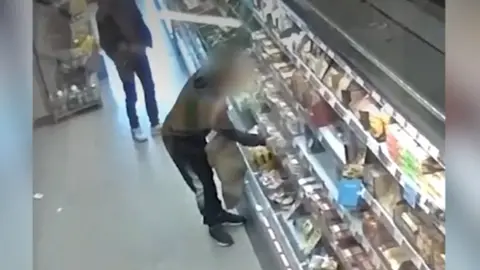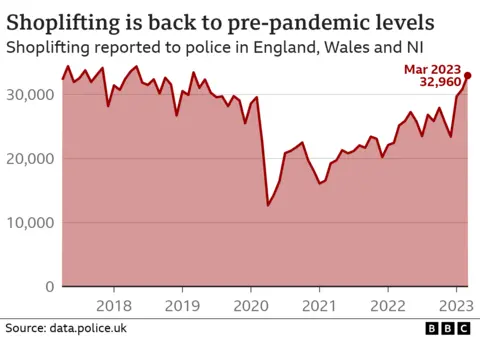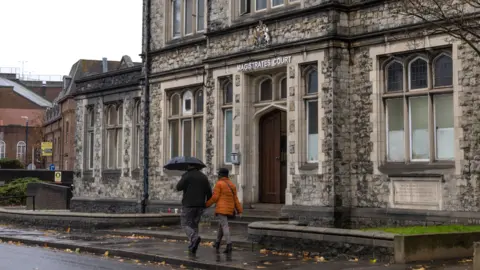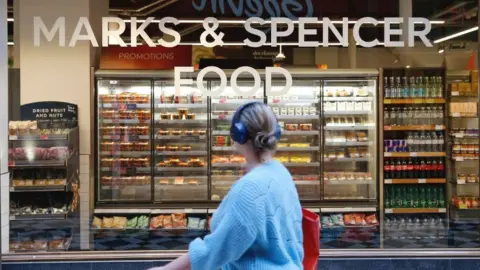Shoplifting: The stories behind the statistics
 BBC
BBCPolice are under pressure to crack down on shoplifting, after the number of offences rose by 24% in England and Wales in 2022-23. So, who is committing these crimes and why? William McLennan went to court to hear some of the stories behind the statistics.
"I'm so sorry," Stacey Willett sobbed as she entered guilty pleas via videolink from a women's prison.
She admitted 23 offences, totalling more than £1,000 in stolen goods.
"These offences are to sustain an addiction, nothing else," her solicitor Vicki Hart told Maidstone Magistrates' Court in Kent.
The 21-year-old, of London Road, Sittingbourne, claimed she had been "dragged up" by a mother with longstanding drug addiction, and had been "given drugs by her mother from a young age," Ms Hart said.
Despite this, she had avoided routine drug use or addiction and "went on to have a child of her own," Ms Hart added.
But when a drugs raid on her mother's house led to her three-year-old daughter being taken into foster care, Ms Willett "simply could not cope", the court heard.
"Drugs were all around her and that was when she increased her use," Ms Hart said. "That became dependency very quickly."
Willett's spell in prison had been her first break from drug use since her daughter was taken away and now with a prescription for methadone, she was released on bail to be sentenced at a later date.
By being caught and convicted, she is in a minority among shoplifters. Last year, more than 50% of shop theft offences were closed with no suspect identified, while fewer than 15% led to a suspect being charged.

More on shoplifting

The government has promised a "zero-tolerance approach to tackling shoplifting", with a new police team treating it like serious organised crime.
BBC South East spent two days at Maidstone Magistrates' Court, covering four shoplifting cases to get a snapshot of who is being convicted and what sanctions they face.
In every one, the defendant had a history of drug addiction.
It is a theme repeated in courts across the country, according to Home Office research that found 70% of shoplifting offences were committed by heroin and crack cocaine users.

Kerry Donoghue is a university graduate who once ran her own recruitment company, but "things have taken a dramatic turn for the worse," defence solicitor Michael Michael told the court.
The 47-year-old, of Jasmine Close, East Malling, admitted 12 shoplifting offences, and possession of cocaine and heroin.
She stole items worth more than £5,400 within five weeks. On one day in March, she targeted Marks & Spencer in Maidstone twice - each time walking away with £500 of meat and alcohol.
Prosecutor James Nichols said Donoghue had a "long record of similar offences", but had not been in court for the past three years.
'Comfort blanket'
Mr Michael said his client had "long stretches of sobriety" broken by periods of drug misuse and crime.
"All her offending is linked to drug use," he said.
On this occasion, an application to combine her benefit payment with her long-term partner had caused all financial support to stop, the court heard.
"That has meant huge debt, high levels of pressure," and a return to Class-A drug use, Mr Michael said.
"She returned to what can only be described as a comfort blanket when she is under pressure," he added.
 Getty Images
Getty ImagesDonoghue was given a 12-month sentence, suspended for 18 months. She was also ordered to attend drug rehabilitation and counselling sessions with the Probation Service.
"[We] really hope you will take this opportunity to stop your offending behaviour, which has gone on for far too long," magistrate Alison Philipps told her.
Lee Haynes was arrested in May after stealing clothes worth £380 from House of Fraser.
"I borrowed money from some people I shouldn't have and I was backed into a corner," the 58-year-old told the court.
Haynes, of Hoo, in Rochester, pleaded guilty at the first opportunity and was frank about his history of offending.
"My record is appalling," he told the court. "I must have, I don't know how many, 50, 60, 70 [past offences]."
He told the court he had been born in prison into a "proper dysfunctional family" in south London.
"From the age of 12, I was on my own," he said, adding that he was using heroin by 15.
 Getty Images
Getty ImagesAfter a stint in prison in 2017, he said he moved to Kent, turned his life around and had been "clean ever since".
But this spring, with his wife in intensive care, he borrowed money from a loan shark to pay for taxis to visit the hospital, he said.
"I just didn't have any money. I had to get to the hospital," he said.
He was ordered to pay a total of £270 in fines and compensation to House of Fraser.
'Hit quite hard'
Daniel Baker, 44, admitted four counts of thefts from shops in Tunbridge Wells in July and August. In total, he stole meat, alcohol and electrical items worth £580.
At the time, his life had been "complicated and extremely chaotic due to drug use", with periods of rough sleeping, his solicitor Andrew Craske.
The court heard Baker had "been diagnosed with PTSD, which seems to stem from a fairly recent bereavement". He is now receiving medication and mental health support, the court heard.
Baker, of Mount Ephraim, Tunbridge Wells, had a history of drug use, but had been working with rehabilitation services at a homeless hostel, until a family member passed away.
"That unfortunately hit him quite hard and he fell back into more regular drug use, which leads to these offences," his solicitor said.
He was handed a community order, which requires him to carry out 10 rehabilitation days and six months of alcohol treatment. He must also pay £160 in compensation.

Follow BBC South East on Facebook, on X, and on Instagram. Send your story ideas to [email protected].
